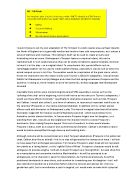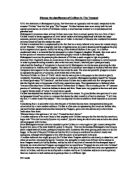Relevance of The Tempest in the Modern World The Tempest, a pastoral tragicomedy by William Shakespeare, was written in the Renaissance period, around 1611. When the play was written, the particular context that the author intended and that the audience received would be different to the meanings and ideas that we pick up from studying or viewing the play now, nearly 400 years later. For example, the way that women in particular are portrayed in old plays such as The Tempest is quite derogatory and would be unacceptable for a modern play. (Unless it was trying to recreate a historical location.) Various meanings in The Tempest demonstrate this difference in the distinct readings that you can find in the text today, and those meanings that we can try to simulate by looking at the text from a historical context.
One meaning that could have been picked up from the play, both in the seventeenth century and now, is that 'there are always lessons to be learnt about your true nature, and always ways to improve yourself.' This meaning is largely picked up from the central character of Prospero, the ruler of the magical island of The Tempest. Prospero, as the self-appointed 'mentor' of the people who have landed on his island, must teach everybody a lesson about themselves, and try to make them better people; for example, the socially-constructed and arrogant Ferdinand. It is unclear exactly how much the love between him and Prospero's daughter, Miranda, was engineered by Prospero and how much was actually love, but by using the love between the young couple, he can make Ferdinand into a upstanding and respectable youth. To do this he gives him some chores to do, such as carrying firewood and other menial tasks. He also freezes him with his magic and keeps him in chains for a while. In doing this, Ferdinand exclaims he would do anything to win Miranda as his wife, ""...Might I but through my prison once a day Behold this maid,"" which secretly pleases Prospero. The others on the island are also taught a lesson: Antonio realizes his guilt for what he has done for the sake of political alliance, after stopping Antonio and Sebastian, they are forgiven (but not repentant.) After punishing Caliban, Stephano and Trinculo, he forgives them and releases them; ""Come hither, spirit. Set Caliban and his companions free. Untie the spell."" The play ends on a lighter note, with a tone of forgiveness and reconciliation, the meaning which can be divined from the play even now.
One meaning that could have been picked up from the play, both in the seventeenth century and now, is that 'there are always lessons to be learnt about your true nature, and always ways to improve yourself.' This meaning is largely picked up from the central character of Prospero, the ruler of the magical island of The Tempest. Prospero, as the self-appointed 'mentor' of the people who have landed on his island, must teach everybody a lesson about themselves, and try to make them better people; for example, the socially-constructed and arrogant Ferdinand. It is unclear exactly how much the love between him and Prospero's daughter, Miranda, was engineered by Prospero and how much was actually love, but by using the love between the young couple, he can make Ferdinand into a upstanding and respectable youth. To do this he gives him some chores to do, such as carrying firewood and other menial tasks. He also freezes him with his magic and keeps him in chains for a while. In doing this, Ferdinand exclaims he would do anything to win Miranda as his wife, ""...Might I but through my prison once a day Behold this maid,"" which secretly pleases Prospero. The others on the island are also taught a lesson: Antonio realizes his guilt for what he has done for the sake of political alliance, after stopping Antonio and Sebastian, they are forgiven (but not repentant.) After punishing Caliban, Stephano and Trinculo, he forgives them and releases them; ""Come hither, spirit. Set Caliban and his companions free. Untie the spell."" The play ends on a lighter note, with a tone of forgiveness and reconciliation, the meaning which can be divined from the play even now.







